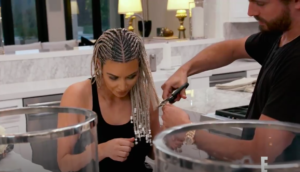October 3rd, 2018
Last night, while taking a hot bath and drinking one cold glass of Pinot Grigio (an activity that has become a Glorious Autumn Habit), I finished reading Ottessa Moshfegh’s My Year of Rest and Relaxation. Not a single character in this bleak satire is “likeable” (they are, of course, all loveable) and love them I did as they hurtled, lost, through their lives. Though hopeful moments are few and far between, the two that come at the end (amidst horrific mass death) are stunning. The book takes place in Manhattan between 2000 and 2001.

Death is present throughout the book–dead parents, dead dogs, dead fruit–and no one has a functional relationship with mortality because, according to the protagonist, their vanity (including her own) has gotten in the way. Thus the book reads like a contemporary literary vanitas: beautiful objects formally arranged to remind the reader that earthly goods (Louboutins for skulls, sleeping pills for wine, Whoopi Goldberg VHSs for hourglasses) are fleeting while spiritual peace is everlasting. The protagonist believes that a year of sleep will bring her this peace in a purity of form: “Mine was a quest for a new spirit.”
One of the last scenes of the novel takes place in the Metropolitan Museum of Art, and culminates in a tense interaction between the protagonist, a security guard, and a painting of grapes in which our sleeping beauty has at last, at long tortured last, seen some humanity. The suspense I felt here reminded me of this episode of the Art Curious podcast, about why certain people at certain times are driven to enter museums and destroy works of art.
But the protagonist does not destroy the art, she simply touches it, in a significant moment John Berger might reflect on as having “almost nothing to do with what anyone teaches about art. It’s as if the painting, absolutely still, soundless, becomes a corridor, connecting the moment it represents and the moment at which you are looking at it. And something travels down that corridor at a speed greater than light, throwing into question our way of measuring time itself.”
The water in my bath cooled; the wine in my glass warmed. I drained the tub and turned on the latest episode of KUWTK. As I watched, the unnamed protagonist’s voice–fed up, mean and funny –was still running through my head. One reviewer said Moshfegh writes sentences “that are snipped as if the author has an extra row of teeth.” On the screen, Scott Disick takes a pair of dull scissors and saws through Kim Kardashian’s Fulani braids, which had begun to make her feel “claustrophobic.” It’s not her real hair anyway, she assured him and Khloe. And even if it was, she didn’t care, she needed out.

